Tamar, Judah, and today’s single women
A story about a single woman in Genesis is a reminder of the pressing need to keep addressing issues of meaning, purpose, and fulfilment in our lives, writes Lina Toth
Related:
Single women in the Church: some portraits
In pursuit of happiness - Adopting society's insistence that a partner and children are essential for a happy life is both a disservice to single people and at cross purposes with Jesus' teaching about family
There is a rather strange story told in
Genesis 38. It starts with Tamar, the widow of Judah’s son Er. Tamar’s father-in-law asks his other son, Onan, to fulfil the duty of a brother-in-law and to ensure she has offspring, as required by the levirate law.

Onan, however, knows that if Tamar bears a son, it will significantly affect his own economic wellbeing. So he resorts to a technique of preventing her pregnancy.
Consequently, Tamar remains childless.
Nothing changes when, after some time, Onan dies as well.
She is promised by her father-in-law that when his youngest son, Shelah, grows up, he will marry her. Yet time goes on, and Tamar realises the promise has been purposefully forgotten.
Finally, Tamar’s mother-in-law dies, and Tamar hears that, after the time of mourning, her father-in-law is going up to Timnah to see his sheepshearers and to take part in local festivities there. She puts aside her widow’s clothes, dresses up as a prostitute, puts a veil on her face, and takes a seat at the roadside at the entrance to Enaim.
Her father-in-law approaches her and negotiates for her services, reaching the deal upon promising this prostitute a kid from his flock; before the kid is sent, however, she demands a deposit, and so Judah leaves his personal identification documents—signet, cord, and the staff.
Tamar keeps them safe and tight, and soon knows that a new life is budding within her. Before long, her pregnancy becomes apparent for others too. She is accused of playing the whore and brought out to her father-in-law who is ready to announce Tamar should be burnt alive for the shame she has brought on the family.
However, Tamar stops the process by presenting the personal identification ‘documents’ to this family court. ‘Take note, please, whose these are’, she says; ‘it was the owner of these who made me pregnant.’
Then Judah utters, ‘She is more in the right than I, since I did not give her to my son Shelah.’
What an uncomfortable story! It can be embarrassing on several accounts as we try to explain, clumsily, how this woman who ‘played the whore’ and tricked her own father-in-law into incest is pronounced to be ‘more in the right’ than the family patriarch.
Some, perhaps, also wonder about the difference between the measure of Tamar’s and Judah’s crime: he was certainly not going to be burned alive.
I wonder if you’ve ever heard a sermon – or preached one – from this text? I am sure it happens from time to time, but it is certainly not the most popular choice. But Tamar’s story has become important to me over the last few years as I set out to consider some important issues for today, and it seems to me it continues to challenge today’s church. Here’s why.
The centre of Tamar’s problem, it would seem, was being left without a husband who would be able to provide her with a male heir. However, deeper than that, the lack of a son meant the lack of both an economic provision and a sense of dignity and purpose for Tamar’s life.
Although the situation of today’s women (in the Western world, at least) is very different, I see in Tamar’s story a reminder of the pressing need to keep addressing issues of meaning, purpose, and fulfilment in our lives. What worries me is that as the numbers of single women are climbing, most churches seem unable to offer to them any kind of healthy, helpful, holistic interpretation of their singleness.
Instead, the churches focus on families – young couples and their progeny which in many ways stands as a symbol of hope for the church’s future.
A number of single women in the church would love to have their own family, but, as the numbers of available men are typically much lower, they find themselves wondering about God’s will for their lives, its relationship to their own yearnings and the church’s teaching – implicit and explicit – on sexuality, spirituality and Christian happiness.
Then there are other single women, who are quite happy as they are, but many of them say that although they are comfortable in their singleness, their church is not.
If there is one thing that Tamar’s story shows us, it is that a yearning for meaning and fulfilment is at the very core of our being. If the churches want to claim to be the ‘family’ of Jesus’ followers, then they must become more serious about this claim in the way they live their lives as communities, and in the way they think and speak of marriage and singleness.
Lina Toth (Andronoviene) is Assistant Principal and Lecturer in Practical Theology at the Scottish Baptist College, and an author of Transforming the Struggles of Tamars: Single Women and Baptistic Communities (Oregon: Wipf and Stock 2014).
Picture: Judah and Tamar/School of Rembrandt/Wikimedia Commons
Baptist Times, 07/09/2015